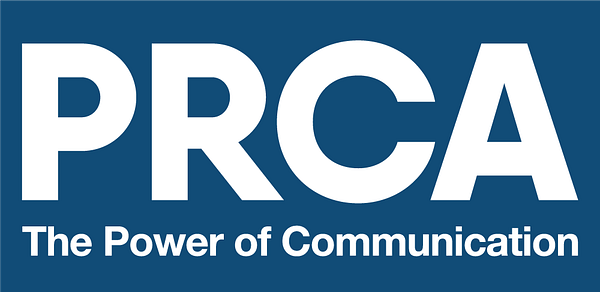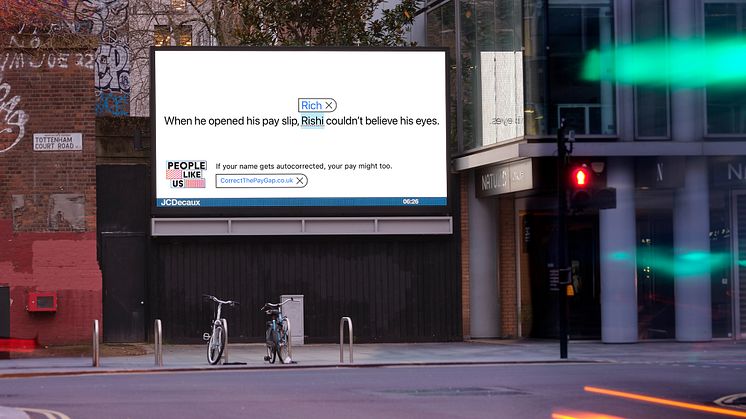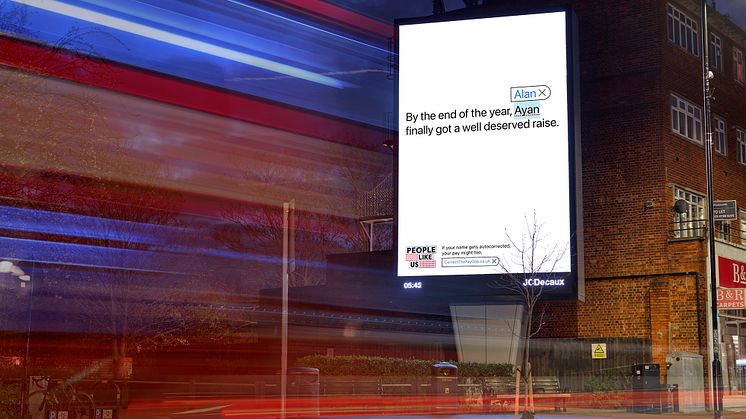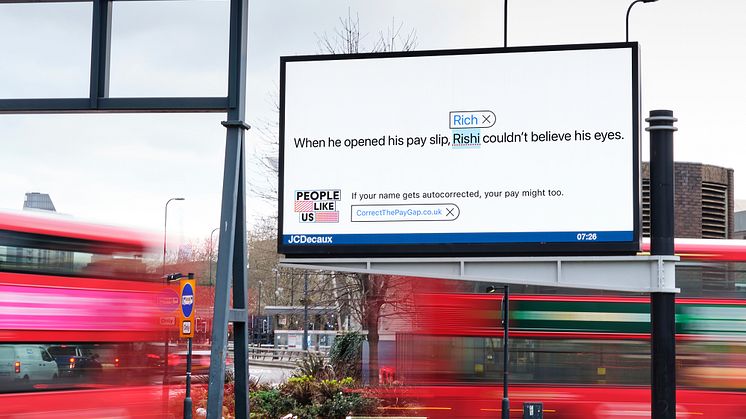
Press release -
People Like Us highlights ‘autocorrect bias’ as it launches national campaign to correct pay gap disparities
Not-for-profit People Like Us is highlighting autocorrect failures, often leading to misidentification and a sense of exclusion for individuals with diverse names. Their latest campaign taps into this insight to help underline the pay gap between ethnicities. Their national ‘Autocorrected Pay Gap’ billboard campaign went live UK wide on April 4th, and uses real autocorrect examples to highlight that subconscious bias in favour of British-heritage names affects everything from autocorrect to your pay packet.
In 2022, People Like Us research showed workers from Black, Asian, Mixed Race and minority ethnic backgrounds are paid 16% less than their white counterparts. It also found that two thirds (67%) of racially diverse working professionals polled said they have had reason to believe that a white colleague doing the same job as them was on a higher salary. A quarter (24%) said they suspected the disparity in pay was up to £5,000, meaning people of colour could be losing out on £255,000 of earnings in a working lifetime due to the stark racially ethnic pay gap*.
Just this weekend, a report from The Living Wage Foundation also highlighted that people of certain ethnicities in London are significantly less likely to earn a 'real living wage', identifying that almost a third of workers with a Pakistani or Bangladeshi background are on low pay. Furthermore, almost a quarter (23.1%) of Black Londoners earn less than what the Living Wage Foundation says is enough to live on.
The call to action across all ‘Autocorrected’ executions drive to a petition asking the government to introduce mandatory ethnicity pay gap reporting. The campaign is the latest installment of work created in partnership with independent creative agency, Worth Your While.
The campaign has been boosted by the partnership with JCDecaux UK’s ‘Community Channel’; the initiative enables not-for-profit community and charitable projects to apply to access digital Out-of-Home locations, in line with JCDecaux’s purpose and values.
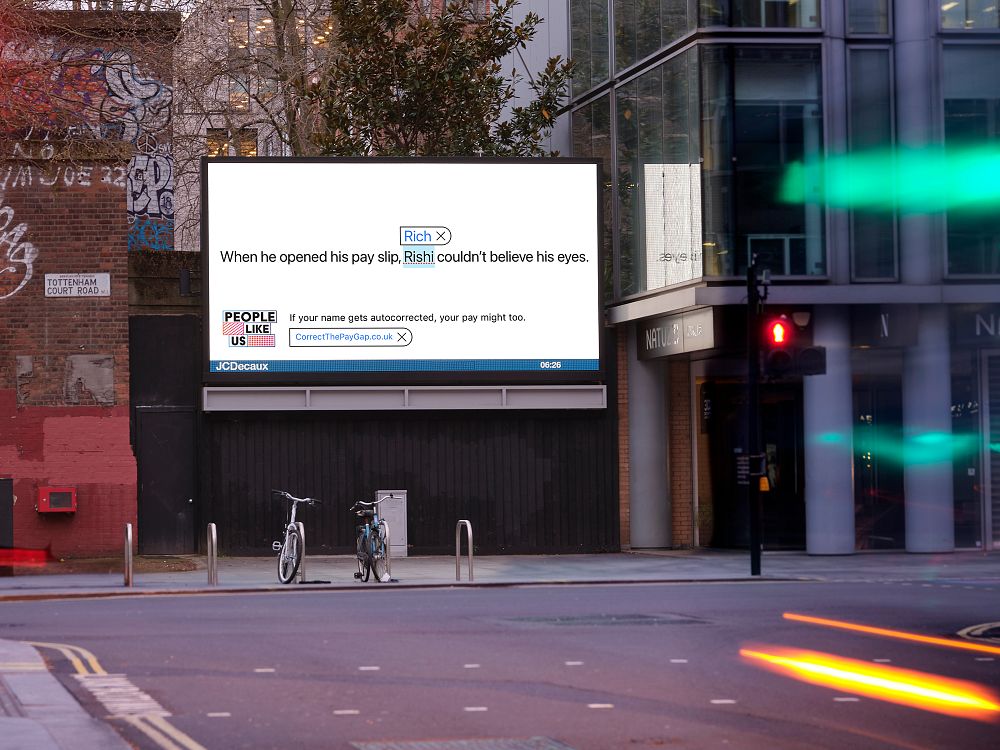
Sheeraz Gulsher, co-founder of People Like Us commented:
“The problem with these types of clunky, and often, offensive autocorrections is that it perpetuates the myth that non-Anglophone names are foreign and difficult to pronounce. It reinforces a homogenous culture that excludes individuals with diverse backgrounds and undermines the efforts of organisations to promote diversity and inclusion in the workplace. Anyone with a diverse name can give you examples of it. Ayan becomes Alan, Rishad becomes Richard and so on.
“And if your name gets auto-corrected by default, your salary might also default to the national average of 16% less – a reality experienced by people of ethnically diverse backgrounds.
Tim Pashen, Creative Director, Worth Your While adds:
“Autocorrect is a set of defaults that help users communicate seamlessly, but sometimes this comes at a cost, contributing to the devaluation of those with diverse names. Considering it’s built into the very tech professionals use to communicate, this felt like a rich tension to explore when it comes to highlighting the ethnicity pay gap.”
Ethnicity pay gap reporting has been debated in parliament over the past two years, however there are currently no plans to make it mandatory. The Commission on Race and Ethnic Disparities’ report and subsequent “Inclusive Britain” report published in March 2022 recommended that businesses report disparities voluntarily, yet there have been low levels of uptake. There have been joint calls for the bill from organisations including the Equality and Human Rights Commission, The Trade Union Congress and the Confederation of British Industry.
Carly Stanley, People Director, JCDecaux UK added:
“Diversity, Equity and Inclusion are hugely important to JCDecaux UK as part of our social priorities. We think the work that People Like Us are doing makes a difference in society and that's why we're currently gathering our data to be able to share our information in the near future.”
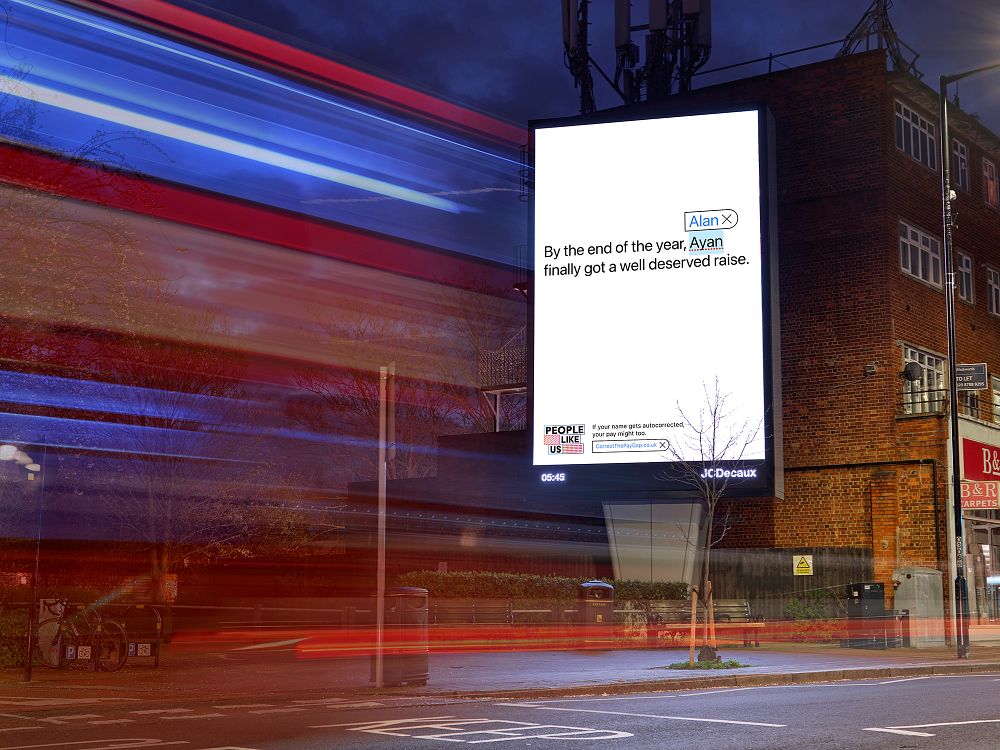
About People Like Us
People Like Us is an award-winning not-for-profit that celebrates and supports UK media, marketing and communications professionals from Black, Asian, Mixed Race and minority ethnic backgrounds. It does this by profiling individuals through quarterly networking events and by supporting professionals with tailored solutions on a range of career related challenges. This includes navigating tricky conversations in the workplace, finding mentors, LinkedIn/CV-shaping and, more broadly, advising organisations on inclusivity.
People Like Us is also on a mission to help foster a fairer workplace for allthrough equitable pay – and not just for those from ethnically diverse backgrounds, and not only those from the marcomms industries.
For more details: www.plu.org.uk.
For all media enquiries, please email sgulsher@gmail.com or visit www.plu.org.uk.
About Worth Your While
Worth Your While is a globally minded independent creative agency making the spectacular stuff people like to talk about, and a founding partner of ‘by The Network’. We happen to be based in Copenhagen.
Topics
The Public Relations and Communications Association (PRCA) is the world’s largest professional PR body.
Representing 35,000 PR professionals in 82 countries worldwide, we are a global advocate for excellence in public relations. Our teams across Europe, the Middle-East and Asia-Pacific work with professionals around the world to co-ordinate our operations across six continents.
Our mission is to create a more professional, ethical, and prosperous PR industry. We champion - and enforce - professional standards around the world through our Professional Charter and Code of Conduct. The Code compels members to adhere to the highest standards of ethical practice.
We deliver exceptional training, authoritative industry data, and global networking, and development opportunities.
We also manage the International Communications Consultancy Organisation (ICCO) - the umbrella body for 41 PR associations and 3,000 agencies across the world. Additionally, we support the delivery of the Motor Industry Communicators Association (MICA).
